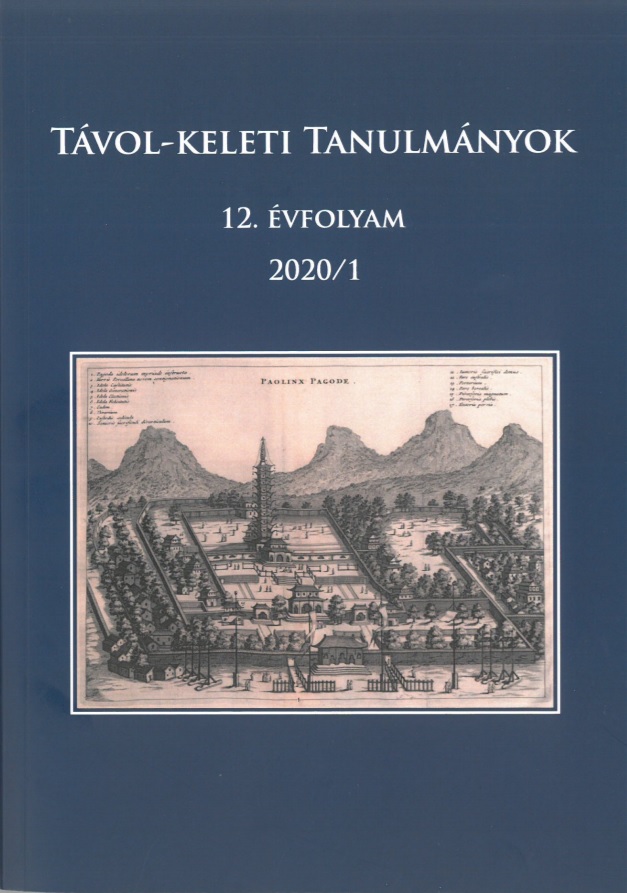Debate topics of Mohists and Confucians in Ancient China. Part 1.: Confucian and other criticism of Mohists
Published 2021-02-25
Keywords
- Mo Di,
- Confucius,
- Confucianists,
- Mohists,
- philosophical debate
How to Cite
Copyright (c) 2021 the author(s)

This work is licensed under a Creative Commons Attribution-NonCommercial 4.0 International License.
Abstract
It is a well-known fact in the history of Chinese philosophy that the 5th–4th c. B.C. witnessed vigorous debates between Confucians and Mohists. We have three types of sources at our disposal reporting on the debates between the representatives of these two groups: 1. External sources, containing reports on the debates by external observers not belonging to either group; 2. Confucian sources, which predominantly contain Confucian criticism of Mohism; 3. Mohist sources, which in turn primarily detail the Mohist criticism of Confucian views. In the present study, I examine the first and the second categories.
References
- Hanfeizi 韓非子: Fu Wuguang 傅武光, Lai Yanyuan 賴炎元 (komm.) 1997. Xinyi Hanfeizi 新譯韓非子. Taibei: Sanmin shuju.
- Hanshu 漢書: Beijing: Zhonghua shuju, 2007.
- Huainanzi 淮南子: Xiong Lihui 熊禮匯 (komm.) 2012. Xinyi Huainanzi 新譯淮南子. Vol. 2. Taibei: Sanmin shuju.
- Lunyu論語: Yang Bojun 杨伯峻 (komm.) 1980. Lunyu yizhu 論語譯注. Beijing: Zhonghua shuju.
- Mengzi 孟子: Yang Bojun 杨伯峻 (komm.) 1988. Mengzi yizhu 孟子譯注. Beijing: Zhonghua shuju.
- Lunheng 論衡: Cai Zhenchu 蔡鎮楚 (komm.) 2012. Xinyi Lunheng duben 新譯論衡讀本. I-II. Taibei: Sanmin shuju.
- Lüshi chunqiu: Zhu Yongjia 朱永嘉 – Xiao Mu 蕭木 (komm.) 2009. Xinyi Lüshi chunqiu新譯呂氏春秋. I-II. Taibei: Sanmin shuju
- Mozi 墨子: Johnston 2010.
- Shiji 史記: Beijing: Zhonghua shuju, 1962.
- Xunzi荀子: Wang Zhonglin 王忠林 (komm.) Xinyi Xunzi duben 新譯荀子讀本. Taibei: Xuesheng shuju, 1981.
- Zhuangzi 莊子: Huang Jinghong黃錦鋐 (komm.) 2007. Xinyi Zhuangzi duben新譯莊子讀本. Taibei: Sanmin shuju.
- Andreini, Attilio 2014. „The Yang Mo 楊墨 dualism and the rhetorical construction of heterodoxy.” Asia 68/4: 1115–1174.
- Csikszentmihalyi, Mark 2004. Material Virtue: Ethics and the Body in Early China. (Sinica Leidensia) Leiden: Brill.
- Csikszentmihalyi, Mark – Nylan, Michael 2003. „Constructing Lineages and Inventing Traditions through Exemplary Figures in Early China.” T’oung Pao (Second Series) 89/1–3: 59–99.
- Fraser, Christopher J. 2009. „The Mohist School.” In: Bo Mou (ed.): History of Chinese Philosophy. London/New York: Routledge, 137–163.
- Fung, Yu-lan 1952. History of Chinese Philosophy, Volume 1: The Period of the Philosophers (from the Beginnings to Circa 100 B.C.). [Trans. D. Bodde] Princeton: Princeton University Press.
- Goldin, Paul Rakita 2005. After Confucius: Studies in Early Chinese Philosophy. Honolulu: University of Hawai'i Press.
- Hamar Imre – Várnai András 2011. „A konfucianizmus első ellenfele: Mozi.” In: Várnai András – Kósa Gábor (szerk.): Bölcselők az ókori Kínában. Budapest: ELTE, Távol-keleti Intézet, 122–155.
- Harbsmeier, Christoph 2013. „The Birth of Confucianism from Competition with Organized Mohism.” Zhongguo wenhua yanjiusuo xuebao 中國文化研究所學報 / Journal of Chinese Studies 56: 1–19.
- Hsiao, Kung-chuan 1979. A History of Chinese Political Thought, vol. 1: From the Beginnings to the Sixth Century A.D. [Trans. F W. Mote] Princeton: Princeton University Press.
- Hutton, Erik L. 2016. Xunzi: The Complete Text. Princeton: Princeton University Press.
- Johnston, Ian 2010. The Mozi: A Complete Translation. Hong Kong: The Chinese University Press.
- Knoblock, John 1988. Xunzi: A Translation and Study of the Complete Works. Vol. I. Books 1–6. Stanford: Standford University Press.
- Kósa Gábor 2013a. „Ling király hivatalnokainak dereka. A Mozi 14–16. fejezetének vizsgálata.” Távol-keleti Tanulmányok 2010 [2013]: 27–59.
- Kósa Gábor 2013b. „Mengzi.” In: Várnai András – Kósa Gábor (szerk.): Bölcselők az ókori Kínában. Budapest: ELTE Távol-keleti Intézet, 65–84.
- Kroll, Paul W. 2015. A Student's Dictionary of Classical and Medieval Chinese. Leiden / Boston: Brill.
- Lai, Karyn L. 2008. An Introduction to Chinese Philosophy. Cambridge: Cambridge University Press.
- Lee, Ting-mien 2014. „When ʽRu-Mo’ may not be ʽConfucians and Mohists’: The Meaning of ʽRu-Mo’ and Early Intellectual Taxonomy.” Oriens Extremus 53: 111–138.
- Nylan, Michael 2009. „Kongzi and Mozi, the Classicists (Ru 儒) and the Mohists (Mo 墨) in Classical-Era Thinking.” Oriens Extremus 48: 1–20.
- Schwartz, Benjamin I. 1985. The World of Thought in Ancient China. Cambridge: The Bellknap Press.
- Shun, Kwong-loi 1991. „Mencius’ Criticism of Mohism: An Analysis of ʽMeng Tzu’ 3A: 5.” Philosophy East and West 41: 2: 203–214.
- Smith, Kidder 2003. „Sima Tan and the Invention of Daoism, ʽLegalism,’ et cetera.” The Journal of Asian Studies 62/1: 129–156.
- Tőkei Ferenc 2005a. Kínai filozófia – Ókor I. Budapest: Magiszter Társadalomtudományi Alapítvány.
- Tőkei Ferenc 2005b. Kínai filozófia – Ókor II. Budapest: Magiszter Társadalomtudományi Alapítvány.
- Tőkei Ferenc 2005c. Kínai filozófia – Ókor III. Budapest: Magiszter Társadalomtudományi Alapítvány.
- Van Norden, Bryan W. 2007. „Mozi and Early Mohism.” In: Virtue Ethics and Consequentialism in Early Chinese Philosophy. Cambridge: Cambridge University Press, 139–198.
- Zufferey, Nicolas 2003. To the Origins of Confucianism: The ru in pre-Qin times and during the early Han dynasty. Bern: Peter Lang.

